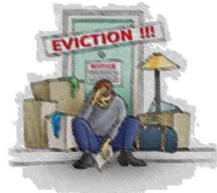Client Alert: From the Scheer Law Group: Update On Evictions During Covid Pandemic

Note: The following is a general discussion on the specified topic or issue and may not be relied on as legal advice in any specific case or matter you encounter. You should review any applicable case, or matter with counsel experienced in this area of law and should not generally rely on the discussion in this Alert.
Date: July 27, 2020
Client Alert:
To: All Scheer Law Group Clients and Affiliates:
Subject: UPDATE ON EVICTIONS DURING COVID PANDEMIC

First a commentary from Spencer Scheer and then an eviction update on ever changing eviction restrictions from Jon Seigel.
Kicking the Can to Eviction Land: Stimulus and Forbearance May not Lead to the Promised Land, by Spencer Scheer
The article from Fast Company (See link below ) is likely a worst case scenario that will not happen, but it could. In a “normal” year, there might be 2 million plus evictions each year. Imagine 11 million in one month as contemplated by Fast Company!
The article does highlight the hidden social pressures building from massive hidden stimulus via debt moratoriums, and that the bill will soon become due. It is an election year, so nothing dramatic will be done until after November, unless you consider 11 trillion dollars of stimulus (not including hidden debt moratorium stimulus) dramatic.
It is the social response to the end of current stimulus that I am concerned with. No administration will just let 11 million evictions commence, and given the current attitude towards the rule of law, 11 million households will not go peacefully into the night, joining possibly as many as one million more households facing foreclosure sales. More forbearance? Higher taxes? Nationwide rent strikes? It is hard to tell, but we better start thinking about it now, or what you are seeing on TV in Portland and Seattle will be coming to your town soon.
July 27, 2020: UPDATE ON EVICTIONS DURING COVID PANDEMIC
By: Jonathan Seigel, Scheer Law Group, LLP
Previously, Scheer law Group generally advised its clients and affiliates about restrictions on evictions imposed by city, county and state governments in serving eviction notices, as well as restrictions on filing new unlawful detainer actions and delays in moving forward on unlawful detainer actions filed before the court restrictions were imposed. Below is an update. Keep in mind that there are two potential layers of delay: restrictions on serving eviction notices and, where the service of eviction notices are allowed, restrictions on filing unlawful detainer actions after the service and expiration of an eviction notice.
Federal Restrictions on Service of Eviction Notices:
There are several moratoria to consider. First, under the CARES Act, with respect to properties securing HUD, Fannie Mae or Freddie Mac loans, and tenants who receive federal rent assistance such as Section 8, the service of eviction notices for nonpayment of rent were prohibited for 120 days from March 27, 2020 through July 25, 2020. That prohibition was not extended and has expired except that the nonpaying tenant must be given 30 days’ notice to pay the rent or vacate.
Second, Fannie Mae and Freddie Mac have prohibited foreclosure-related evictions for single family homes through August 31, 2020. These evictions typically involve the purchaser at a foreclosure sale evicting the borrower or tenants.
Third, evictions before August 31, 2020 are prohibited with respect to properties securing FHA, VA and USDA loans. These mostly involve single family homes.
Fourth, if the property owner has obtained forbearance as to loan payments with respect to a federally-backed loan, the property owner may not evict during the forbearance period and must thereafter provide 30 days’ notice to pay the rent or vacate.
In addition, there has been discussions about extending the various federal restrictions as part of the coronavirus legislation being negotiated in Washington.
Note that, even if there is no longer a federal restriction on evictions, state or local restrictions may still apply.
Local Restrictions on Service of Eviction Notices:
Governor Newsom’s Executive Order allowing cities and counties to impose restrictions on the service of eviction notices has been extended through September 30, 2020. Pursuant to this authority, cities and counties have imposed various types of moratoria on the service of eviction notices. Some jurisdictions have prohibited the service of any eviction notices, others have prohibited the services of eviction notices for any nonpayment of rent, others have allowed the service of eviction notices for nonpayment of rent but have extended the cure period, still others have allowed the service of eviction notices but have prohibited evictions if the tenant shows that the failure to pay rent was directly or indirectly related to COVID-19, and more. Some moratoria applies to residential cases only and others apply to both residential and commercial cases.
In addition, as we discussed in our last update, some jurisdictions have prohibited residential evictions at any time based on unpaid rent accruing during the pandemic period and have declared the unpaid rent to be consumer debt subject to a collections lawsuit, but not an unlawful detainer lawsuit. A lawsuit has been filed by property owners challenging San Francisco’s enactment of this type of legislation. We will keep you informed of any developments.
Restrictions on Filing New Unlawful Detainer Actions:
As we previously advised you, the California Judicial Council, a group that oversees the state court system, enacted an emergency rule prohibiting the filing of new unlawful detainer actions, residential or commercial, except those involving threats to public health or safety, until 90 days after the Governor’s Executive Order expires or such other date specified by the Judicial Council. Because, as stated above, the Executive Order is set to expire on September 30, 2020, unless the Judicial Council acts otherwise, new unlawful detainer actions may not be filed until the very end of December 2020. In addition, if the expiration of the Executive Order is again extended, so will the prohibition on filing new unlawful detainer actions.
A lawsuit has been filed by property owners challenging the Judicial Council’s authority to prohibit the filing of new unlawful detainer actions after the Governor’s Executive Order expires. We will keep you updated.
Pending Unlawful Detainer Actions:
As to unlawful detainer actions filed before the prohibition on new unlawful detainer actions, under the Judicial Counsel’s emergency rules, no defaults may be taken and cases are to be set for trial no sooner than 60 days after a party requests a trial date. For a time, courts were closed and pending unlawful detainer cases were essentially frozen. Courts have begun to reopen and, subject to the restrictions on defaults and trial dates, most courts are now processing paperwork, hearing pretrial motions, and some are starting to conduct nonjury trials. The courts are backlogged and some county courts are moving cases forward more quickly than others.
One problem for all courts involves jury trials. Due to Shelter in Place Orders, courts have generally not been able to assemble jury panels for unlawful detainer cases. For example, in a case being handled by the Scheer Law Group in San Francisco, an unlawful detainer jury trial scheduled for July was continued to September. Whether a jury panel can be assembled in September remains to be seen and it would not be surprising if the trial is further continued.
Please call or email if you would like to discuss.
Spencer Scheer
Our
Locations
Northern California Office
155 N. Redwood Drive, Suite 100
San Rafael, CA 94903
Telephone: (415) 491-8900
Facsimile: (415) 491-8910
Southern California Office
85 Argonaut, Suite 202
Aliso Viejo, CA 92656
Telephone: (949) 263-8757
Facsimile: (949) 308-7373
Send Us Your Information &
Get Started Today
Fields Marked With An “*” Are Required


